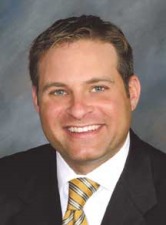Estates -your plan your way
Peace of mind through retirement and beyond
By Todd C. Ratner, Esq.
Estate planning attorney with Bacon & Wilson, P.C of Springfield, MA.
During the course of your life, you've probably spent a lot of time worrying about making a decent living. But as the years pass, your attention is likely shifting away from taking care of yourself to ensuring that your loved ones are cared for after you're gone. There are certain things that you must do to protect your family and your wealth.
Estate planning is an ongoing process for accomplishing lifetime goals and planning for the disposition of assets at death. It is appropriate at any stage of life but particularly relevant when retirement realities hit. There are several essential considerations regardless of the size of your estate.
The will
Everyone needs a will, the most basic estate planning document. It provides for the orderly distribution of your estate upon your death. If you do not draft a will or use some legal method to transfer assets when you die, Massachusetts law will determine what happens to your property according to a predetermined legal formula that may very likely not adhere to your preferences.
In the creation of a will, you can designate trusts to be created, guardianships over minor children and how other essential matters should be handled. In your will you also name the executor of your estate. This is the person entrusted with carrying out your expressed wishes and distributing your property as you designated. Therefore, if you're concerned how your estate will be divided, you should have a current and valid will.
The health care proxy
Another essential estate planning tool is a health care proxy. This document allows a designated person called a "health care agent" to make health care decisions for you if you become incapacitated and cannot make them yourself. Without this document, your family will be forced to hire an attorney, go to court and have someone appointed as your guardian to make decisions on your behalf. This process is typically expensive, public, time-consuming and easy to avoid with proper planning.
A health care proxy can incorporate "living will" language that provides a set of guidelines for the health care agent and lets him or her know what your health care preferences are, including whether or not you wish to be kept on life support if you are in an irreversible coma. Although living will language is not legally binding, it can be very useful in providing your agent with a set of guidelines to follow when making health care decisions for you. It clarifies your wishes with your doctor, the hospital and your family.
Durable Power of Attorney
Another critical estate planning tool is a durable power of attorney. This document gives a person called the "attorney in fact" the ability to handle your financial affairs during your lifetime when you are incapacitated. This includes paying your bills, executing a deed, making gifts, having access to your safe deposit boxes, bank accounts, etc.
Due to the great responsibility of the position, individuals that become an attorney in fact must, by law, act in good faith at all times on your behalf. If you have not executed a durable power of attorney, you can only hope that someone will become a conservator for you. This court-appointed person will manage your financial affairs when you are legally incapable of doing so. Conservatorship is a lengthy and expensive court procedure, and in many cases, there is not enough money and time to go through the court proceedings necessary to establish the conservatorship.
Declaration of Homestead
The final basic estate planning document is the Declaration of Homestead. In Massachusetts, an estate of homestead is designed to protect your possession and enjoyment or that of your surviving spouse and dependent children against the claims of creditors by protecting your primary residence from execution and forced sale. Upon the filing of a Declaration of Homestead, your principal residence is protected against attachment, levy on execution and sale for payment of debts to the extent of Five Hundred Thousand ($500,000.00) dollars. The Homestead Act is not and should not be used or relied upon as a substitute for adequate home insurance or any other type of liability insurance.
For estates over $1 million
The estate planning methods discussed above often fall short regarding taxable estates that, for Massachusetts purposes, include estates over one million ($1,000,000) dollars. At that level, your estate will face a new variety of planning issues and will be dictated by your personal financial situation and your preferences.
Estate planning is a broad term that can encompass many things, and there are more estate planning choices available today than ever before. You get "do-overs" in quite a few things in life, but retirement planning is not one of them. A well-developed estate plan could help prevent the federal government from becoming your primary beneficiary. Therefore, no matter what your age, estate planning is not something that should wait.
Todd C. Ratner is an estate planning, business and real estate attorney with the Springfield-based law firm of Bacon Wilson, P.C. He is a member of the National Academy of Elder Law Attorneys and recipient of Boston Magazine's 2007 Massachusetts Super Lawyers Rising Stars award. 413-781-0560; TRatner@BaconWilson.com 2008, Todd C. Ratner, Bacon Wilson, P.C. Attorneys at Law
